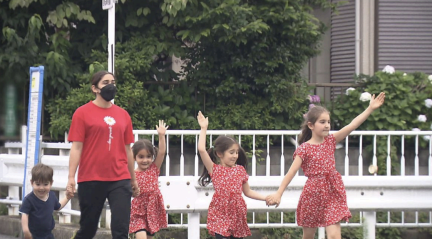Mizuki Uchiyama
July 13, 2022
As Japan welcomes Ukrainian refugees with housing and employment support, Kurdish asylum seekers from Turkey are finding the doors less open. Japan’s diplomatic priorities play a significant role: support for Ukrainians aligns with its stance against Russia, while accepting Kurdish refugees could strain relations with Turkey, a valued partner in the Middle East.
Despite the challenges, some Kurds, including the estimated 2,000 to 4,000 residing in Japan, still choose Japan as a final destination, often entering on tourist visas before applying for asylum. Many are driven by a dwindling number of safe options in their home countries and the support they find within the Kurdish community in Japan.
Japan’s aging population and labor shortages have sparked conversations about immigration, but public sentiment remains conservative. While minor adjustments have been made to welcome foreign workers, policies surrounding refugees remain restrictive.
A Personal Struggle Amid Policy Constraints
A Kurdish mother of four, who would give her name only as Hanim, expressed her frustration over the disparity in Japan’s treatment of Ukrainians and Kurds. She is asking that decisions affecting their lives not be judged based on nationality or race.
Hanim and her husband live in Kawaguchi City, Saitama Prefecture, just north of Tokyo. When they arrived from Turkey seven years ago with their 2-year-old daughter, they relied on relatives living in Japan. Since then, they’ve had three more children.
The Kurds, who number between 20 million and 30 million in Turkey, Syria, Iraq and Iran, are often referred to as “the world’s largest ethnic group without a country.” In Turkey, Kurdish movements for autonomy and independence have been suppressed and labeled as terrorism. In 2015, the Turkish government cracked down on armed Kurdish groups, resulting in 1,200 deaths and displacing at least 350,000 people.
Hanim came to Japan that year. When she was a child, her father and older brother were detained by the military. At school, she faced bullying for being Kurdish and was even physically punished by teachers for speaking Kurdish.
Arrest Warrant from Turkey
Hanim came to Japan to escape discrimination and persecution. Translated court documents from Turkey referred to her as “Suspect Hanim.”
Five years ago, after she posted a video on social media of herself performing Kurdish music at Kawaguchi Station, Turkey issued an arrest warrant charging her with spreading terrorist propaganda. Unaware of the warrant, Hanim visited the Turkish embassy in Tokyo, only to be informed that she was banned from leaving Japan. Officials punched a hole in her passport, making it invalid.
Refugee Applications and Residence Status Denied
Hanim applied for refugee status in 2017, but her application was rejected. She appealed, presenting evidence of persecution, including the arrest warrant and her invalidated passport. During this period, she was granted a residence permit allowing her to work, and she supported her family by working at a cake shop. But at the end of last year, her refugee application was rejected again, and she could no longer renew her residence permit. Without a valid residence permit, she lost her job, and the family now relies on money borrowed from relatives to survive.
Unable to Afford Medicine for Her Child
Hanim’s greatest concern is her 3-year-old son, Adal, who suffers from a severe congenital heart defect. Born in a hospital in Saitama Prefecture, Adal has undergone surgery five times. He now relies on a pacemaker and multiple medications.
With her residence status lost and health insurance no longer available, Hanim must cover all medical expenses out of pocket. She was given a receipt for 210,000 yen (US$1,407) for a two-month supply of medicine and was informed that his next surgery, scheduled for November, would cost more than 1.8 million yen (US$12,059) without health insurance. She can afford only a portion of his medication and has reduced medical visits to once every two months.
The doctor has indicated that Adal needs continuous treatment, but Hanim is uncertain how she will manage the costs.
“Ukrainians Are People, but Am I Not a Person?”
Last month, Hanim visited the immigration bureau with receipts for Adal’s medicine, medical certificates and other documents to explain her dire situation. She was seeking residence status to enable her to work for her son’s sake. Her request was once again denied.
“When Ukrainians come to Japan, the government provides support, companies offer them jobs, and they are given housing free of charge,” Hanim said. “Ukrainians are people, but am I not a person?”
Japan’s Restrictive Refugee Policies
Japan has signed the Universal Refugee Convention, which outlines countries’ legal obligations to protect refugees. Yet last year Japan gave only 74 refugees legal status, an acceptance rate of about 0.7%. This figure is extremely low compared to Germany, with nearly 40,000 refugees, and Canada and France, with over 30,000 each.
Notably, no Kurds from Turkey had been granted refugee status in Japan as of June 2022. Asked why, Tsuyoshi Ohashi, secretary-general of the Kurdish Refugee Lawyers Group, said: “Japan’s acceptance of refugees is influenced by diplomatic relations. The Japanese government aims to maintain friendly relations with the Turkish government, making it difficult to accept Kurdish refugee applications. Conversely, Japan’s stance against Russia makes it easier to accept Ukrainian citizens.”
Ohashi added that an independent third-party organization, not influenced by diplomatic relations, should be established to handle these decisions. In other developed countries, he said, an independent organization often reviews appeals from individuals initially denied refugee status. “Those left behind in the current refugee system continue to suffer,” Ohashi said.
Naoko Hashimoto, an associate professor of International Refugee Law at Hitotsubashi University, notes that Japan’s handling of refugee applicants often involves prolonged detention and provisional release, raising humanitarian concerns. “Increasing the number of people on provisional release is not inherently negative,” Hashimoto explained. “Long-term detention imposes a significant cost on public funds and raises serious human rights concerns. From a humanitarian perspective, it’s not desirable.”


